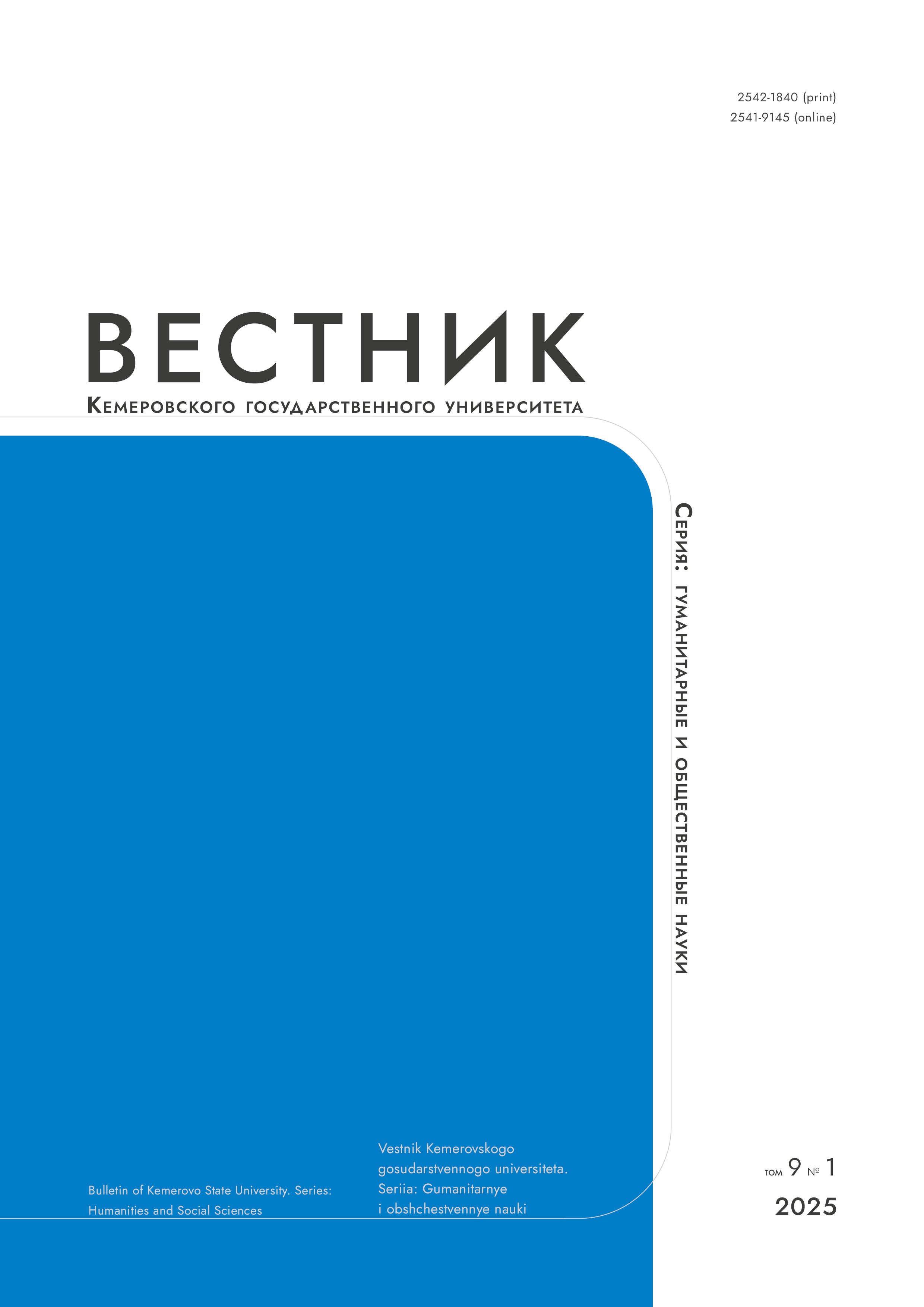Sankt-Peterburg, Russian Federation
from 01.01.2018 to 01.01.2019
Kemerovo, Russian Federation
Kemerovo, Russian Federation
UDC 37
The article deals with information visualization techniques aimed at effective development of cognitive processes as parts of students' cognitive activity. The research featured the means of visualization of educational information that encourage the cognitive activity in students. The research objective was to identify, justify, and test the possibilities of using visualization tools for educational information. The cognitive activity is represented as a set of cognitive acts, namely explanation, understanding, and reflection. The authors believe that the process of interaction between participants in educational relations needs to be improved. The article focuses on the organization of the informational approach to training. It describes the stages of work with educational information: search for new material, its perception, processing, and application. The visualization technologies include mind maps and denotational graphs. Visualization technologies provide positive changes in students’ cognitive activity and develop cognitive motivation.
informatization of education, informational approach to learning, training system, stages of working with information, mental operations, mental activity, graphical diagrams, mind maps, denotational graph
1. Rubinstein S. L. Fundamentals of general psychology. St. Petersburg: Piter, 2015, 705. (In Russ.)
2. Morozova I. S. Motivation as a factor in optimizing the thought process. Cand. Psychol. Sci. Diss. Novosibirsk, 1999, 135. (In Russ.)
3. Lyaudis V. Ya. Methods of teaching psychology, 2nd ed. Moscow: Psykhologiia, 1999, 85. (In Russ.)
4. Lyaudis V. Ya. Psychology of innovative teaching in dialogue with cultural-historical psychology L. S. Vygotsky. Izvestiia akademii pedagogicheskikh i sotsialnykh nauk, 1996, (1): 6-11 (In Russ.)
5. Morozova I. S. Cognitive activity of personality. Kemerovo: Kuzbassvuzizdat, 2002, 214. (In Russ.)
6. Kolokoltseva O. V. Features of administrative process and motivation of participants of the educational relations. Basis, 2019, (1): 69-73. (In Russ.)
7. Kazakevich V. M. Paradigm of innovation learning methodologies based on the theory of information processes. Otechestvennaya i zarubezhnaya pedagogika, 2019, 1(3): 151-164. (In Russ.) DOI:https://doi.org/10.24411/2224-0772-2019-10024
8. Pak N. I. About the concept of information approach in training. Vestnik Krasnoyarskogo gosudarstvennogo pedagogicheskogo universiteta im. V. P. Astaf'yeva, 2011, (1): 91-97. (In Russ.)
9. Milyutina A. A. Information approach in the field of formation of media competence of junior schoolchildren in Russian language lessons. Zapadno-sibirskii pedagogicheskii vestnik, 2014, (1): 142-149. (In Russ.)
10. Dmitrieva M. V. Information search on the Internet. Kompiuternye instrumenty v obrazovanii, 1999, (6): 7-18. (In Russ.)
11. Rosenberg I. N. Complex information retrieval. Educational resources and technologies, 2017, (1): 41-49. (In Russ.) DOI:https://doi.org/10.21777/2312-5500-2017-1-41-49
12. Grekova L. V. Information search in computer science and library science. Scientific statements of Belgorod State University. Series: Economy. Computer science, 2013, (1): 95-100. (In Russ.)
13. Borzova T. V., Mosunova L. A. The conditions for fostering meaningful understanding of information in learning. Science for Education Today, 2020, 10(1): 7-24. (In Russ.) DOI:https://doi.org/10.15293/2658-6762.2001.01
14. Dikovitsky V. V., Shishaev M. G. Processing of human language texts in search systems models. Trudy Kolskogo nauchnogo tsentra RAN, 2010, (3): 29-34. (In Russ.)
15. Engel E. A. Using intelligent algorithms for the text information processing. Vestnik Sibirskogo gosudarstvennogo aerokosmicheskogo universiteta im. akademika M. F. Reshetneva, 2010, (2): 62-68. (In Russ.)
16. Ospennikova E. V., Ospennikov A. A. Formation of students' general approaches to work with educational information on physics presented in a virtual subject environment. Vestnik Permskogo gosudarstvennogo gumanitarno-pedagogicheskogo universiteta. Seriia: Informatsionnye kompiuternye tekhnologii v obrazovanii, 2009, (5): 76-107. (In Russ.)
17. Volkov V. V. Retelling as a way of mastering the content of the text. Kultura. Dukhovnost. Obshchestvo, 2015, (16): 145-150. (In Russ.)
18. Peskova O. V. About information visualization. Vestnik Moskovskogo gosudarstvennogo tekhnicheskogo universiteta im. N. E. Baumana, 2012, (1). Available at: http://engjournal.ru/catalog/it/hidden/24.html (accessed 15.07.2020). (In Russ.)
19. Verbitsky A. A. Active higher education: contextual approach. Moscow: Vyssh. shk., 1991, 207. (In Russ.)
20. Cherkasova L. V. Technology of visualization of the training material as the way of formation of information competence among school students. Bulletin of SurGPU, 2019, (1): 132-141. (In Russ.) DOI:https://doi.org/10.26105/SSPU.2019.45.14.014
21. Pukhov A. F. Effective use of visualization in the learning process. Kompiuternye instrumenty v obrazovanii, 2006, (6): 56-62. (In Russ.)
22. Borisova E. M., Loginova G. P. Diagnostics of mental development based on a qualitative analysis of the test. Voprosy psikhologii, 1986, (2): 149-155. (In Russ.)
23. Prikhozhan A. M. Psychology of anxiety: preschool and school age, 2nd ed. St. Petersburg: Piter, 2007, 192. (In Russ.)
24. Dronova E. N. Mental card in the learning process: the role and basis of development. Problemy sovremennogo obrazovaniya, 2017, (2): 118-124. (In Russ.)
25. Bronnikova L. M., Maier E. I. Methodical aspects of the use of mental maps in the educational process. Pedagogicheskoe obrazovanie na Altae, 2017, (1): 30-33. (In Russ.)
26. Khakimov D. R. Use in educational process mental map. Educational resources and technologies, 2016, (1): 3-8. (In Russ.)
27. Kryukova T. V. Using of denotat count in the content analysis of the text. International Scientific Review, 2016, (3): 181-186. (In Russ.)
28. Peshkova N. P. The project "Text psycholinguistics. Text and its sense: regional investigations the Novikov school". Voprosy psikholingvistiki, 2018, (36): 168-181. (In Russ.)
29. Smirnova A. S. Graphic presentation of information. Mezhdunarodnyj nauchno-issledovatel'skij zhurnal, 2012, (6-2): 61-64. (In Russ.)


















